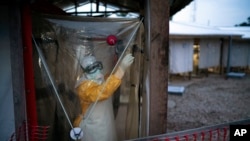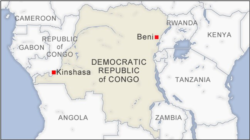The World Health Organization says it remains committed to ending the Ebola outbreak in Eastern Democratic Republic of Congo following discovery of a new case of the disease days before DRC authorities had hoped to declare the epidemic over. An Ebola epidemic is declared over after two incubation periods or 42 days have passed without a confirmed case of the disease.
After 52 days without a case of Ebola, a 26-year-old man died of the disease in the city of Beni. WHO Chief Tedros Adhanom Ghebreyesus says this is not welcome news, but adds it was not unexpected.
“We have been preparing for, and expecting, more cases. Unfortunately, this means the government of DRC will not be able to declare an end to the outbreak on Monday, as hoped. But WHO and all partners remain on the ground and committed as ever to working with the government, under the leadership of the government and with affected communities and other partners to end the outbreak,” he said.
WHO reports 3,456 cases of Ebola, including 2,276 deaths since the outbreak was declared August 1, 2018. This is the second-worst outbreak, after the historic 2014 epidemic in West Africa, which infected more than 28,000 people, killing 11,300.
The head of WHO’s health emergency committee, Michael Ryan, says the positive news to emerge from this setback is that the international operation tracking the Ebola epidemic was on the alert and responded quickly.
“Every day, we investigate 2,600 alerts across the two affected provinces still. We take thousands of samples every single week and we will continue that active surveillance right the way through. We will just have to go again for another 42 days,” said Ryan.
WHO reports efforts are underway to find everyone who may have been in contact with the infected person. It says everyone will be offered the protective vaccine and their health status will be monitored.
It says the international response team will continue to trace and track every case in North Kivu and Ituri provinces until this epidemic is brought to an end.








